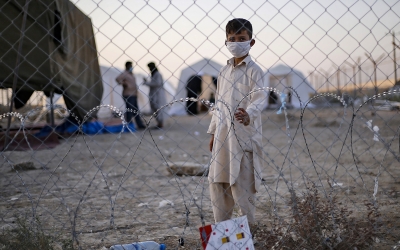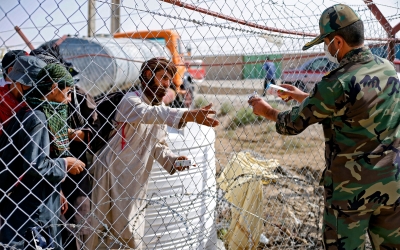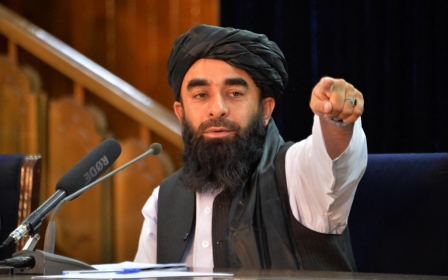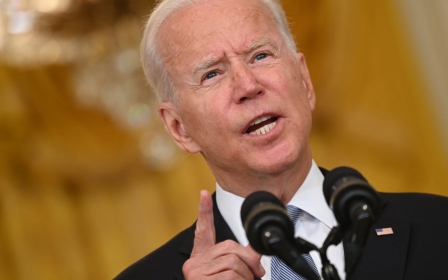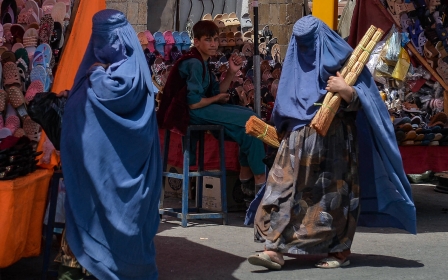Afghanistan: Persecuted Hazara Shia unconvinced by Taliban reassurances to Iran
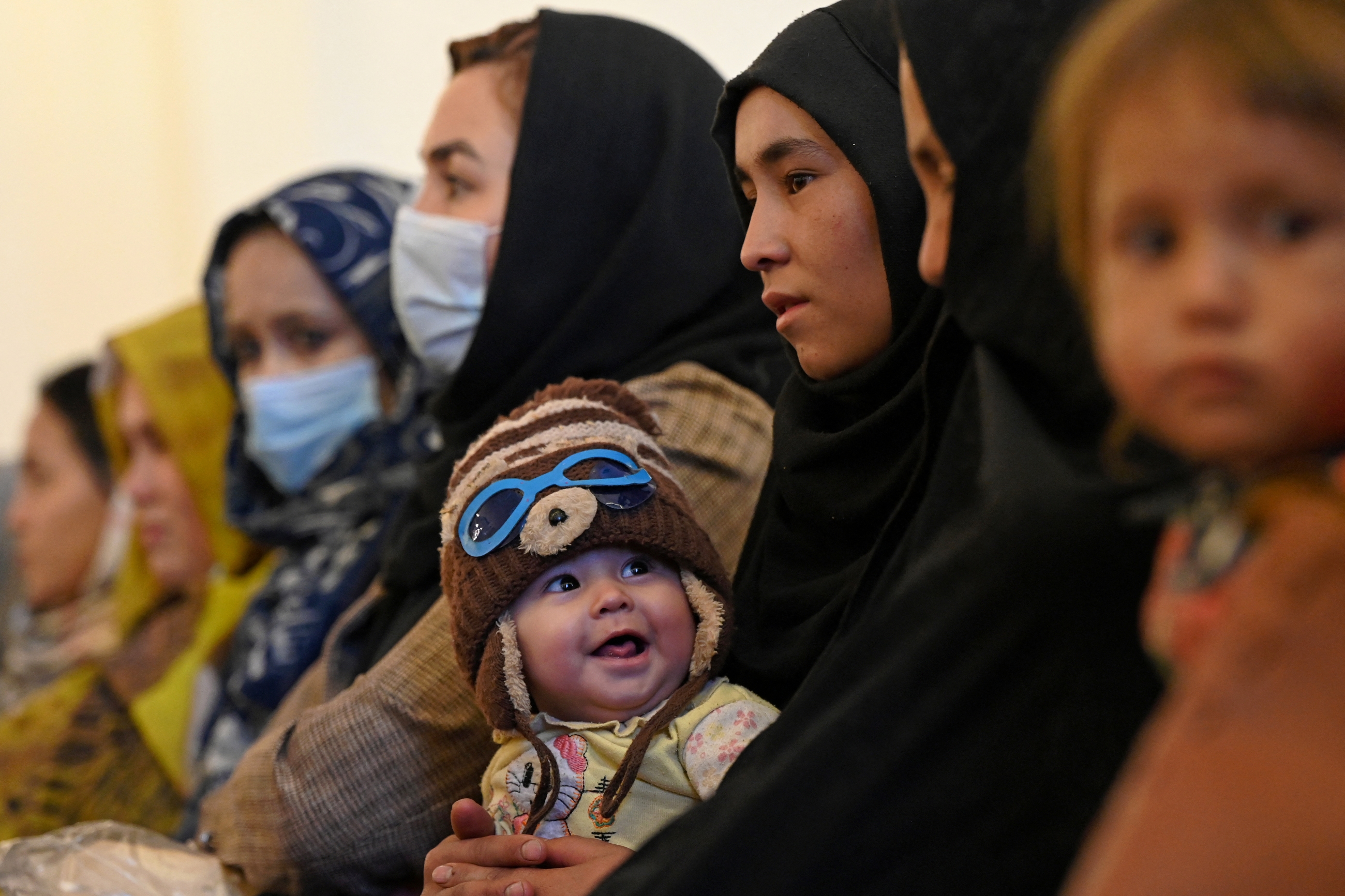
Six years ago, Hadi Ghoreishi fled his home in Afghanistan's Bamiyan, a province notorious for Taliban brutality and destruction.
Now, he works as a concierge in a residential complex in central Tehran and - like many Afghan refugees - has a temporary residence permit that he must renew every year, a precarious situation but one he feels is better than the risks he may face at home.
Ghoreishi is a member of Afghanistan's Hazara Shia minority, a group who faced severe repression under the rule of the Taliban in the 90s. Around 500,000 Hazaras live in neighbouring Iran, a nation that shares largely the same religion and language as the minority group.
It was with dismay, then, that Ghoreishi watched the rapid re-capture of his homeland by the Taliban earlier this month, as well as the overtures made by the Iranian government towards the militant group.
"In recent years, the Taliban and Iranian government have become closer and closer because they have both fought against the US in the region. They are not enemies anymore, and we have heard that all high-ranking Iranian officials congratulated the Taliban for their victory," he told Middle East Eye.
"Iran is like other countries; they have all left the Afghan people alone. Of course, we wished Iran supported the Afghan people against the Taliban, but is it possible? I just hope that I can renew my residency permit next time I go to the immigration office."
Hazaras suffered massacres and the repression of their religious practices under the Taliban in the 90s. In one particular brutal incident in 1998, Taliban fighters summarily executed hundreds of Hazara men and boys in the northern city of Mazar-e-Sharif, in what Human Rights Watch described as an openly sectarian massacre.
'I don't know why the Iranian government does not support us, even though we speak the same language and practice the same religion'
- Hafizollah Matbou, Hazara from Bamiyan
This time around, with an eye to improving its international image, the Taliban has assured neighbouring Shia powerhouse Iran that it will protect the group, and its fighters have been pictured taking part in Shia religious ceremonies.
Last week, sources confirmed to MEE that "several agreements" had been made between the Taliban and Iran that Afghan Shias would not be attacked.
However, members of the minority group have little faith in such assurances and fear that it won't be long before the group returns to its old ways.
Hafizollah Matbou, 59, escaped the capital Kabul 25 years ago after the city fell into the hands of the Taliban. Now he is a construction worker in the Iranian capital, while his family of five lives in Eslamshahr, an impoverished city nearby.
"All we want from the Iranian government is to let us live and work here. After 25 years of living in Iran, I'm still a refugee with a temporary residence permit. My children were all born here, but they also have identical statues as me. My brother went to Sweden about 15 years ago, and now he has a permanent residency permit and a job of his choice," he said.
Afghan refugees in Iran have long faced widespread discrimination and even decades after fleeing many still live a highly precarious existence.
"I don't know why the Iranian government does not support us, even though we speak the same language and practice the same religion," said Matbou.
'We do not harm minorities'
In interviews with Western-facing media, the Taliban's spokespeople have been at pains to stress that the country's minority groups - which include Hindus, Sikhs, the country's last remaining Jew and a whole host of tribal and ethnic groups - would be protected.
"We do not harm minorities,” said Suhail Shaheen, the Taliban spokesman in Qatar, unwittingly speaking to Israeli media last week.
“There are Sikhs and Hindus in the country, and they can practice their religion."
The promise has already begun to ring hollow, however.
In July, the Taliban "tortured and massacred" a number of Hazara men in Afghanistan's Ghazni province, according to Amnesty International.
In the report, Amnesty said nine Hazara men were killed between 4 and 6 July in the province's Malistan district. Six men were allegedly shot - some in the head - while three were tortured to death.
Following the capture of Afghanistan, Taliban fighters decapitated a Hazara anti-Taliban fighter, Abdul Ali Mazari, in Bamiyan, and later hoisted their flag on Mazar-e-Sharif's Hazrat Ali mosque, an important shrine in Shia Islam believed to be one of the possible burial places of the Prophet Muhammad's son-in-law, Imam Ali ibn Abi Talib.
In an apparent attempt to downplay its sectarian reputation, for the holy month of Muharram a number of Taliban members attended a Shia ceremony in the Hazara-populated Kabul district of Dasht-e-Barchi.
But with the world's eyes on the country, Hazara in the diaspora believe it's all a PR game.
"They hate our guts," said Akram Gizabi, director of the World Hazara Council diaspora organisation, describing the Taliban's appearance at the Muharram ceremony as "sheer demagoguery" as the group "consider Shia to be infidels and not Muslims".
He told MEE that the future for the Hazaras was "extremely bleak and dire" and that he had received numerous reports from his contacts in Afghanistan of women being harassed, houses being looted and arbitrary arrests being carried out.
He also criticised Iran's engagement with the group.
"I don’t think [Iran] really care about the Shia, or that the Taliban will really change their attitudes towards the Shia and Hazaras just to make Iran happy," he said.
"Contrary to all the things the people say, the Taliban have not changed, they will not change … so their attitudes towards the Hazaras and the Shia will remain the same."
'I'm in peace here'
Afghan refugees in Iran have been alarmed by the Taliban takeover of Afghanistan.
Sporadic demonstrations have broken out across the country opposing the seizure of power and calling for the protection of Hazaras and other minorities, including in Tehran and the holy city of Qom.
Numerous Iranian figures, particularly in the opposition, have also raised concerns over the Taliban victory. Few have forgotten 1998 when, following the Taliban massacre of Iranian diplomats, Iran began a build-up of more than 200,000 troops on the Afghan border as a precursor to a possible invasion.
'I'm in peace here. I do my work, and at the end of the week, I am paid in cash. It's not a lot of money, but I am happy that I don't need to fight'
- Habib, 24
But so far there has been little or no public statements from the government or leading Iranian political figures by way of support for Afghanistan's Shia.
While there is a lot of concern, and a lot of fear for their community, at the same time some Hazaras in Iran are more fearful of being returned to their homeland - something which is likely to become a major talking point internationally as the flow of refugees continues.
Habib, a 24-year-old undocumented refugee from Mazar-e Sharif who preferred not to reveal his full name, is just happy to be far from the havoc engulfing his country.
"I'm in peace here. I do my work, and at the end of the week, I am paid in cash. It's not a lot of money, but I am happy that I don't need to fight," he explained.
Habib came from Afghanistan two years ago and says that he was previously a member of a local militia group led by a pro-government strongman.
Now he works in a tourist-friendly village in the northern part of Tehran, in a region called Lavasan, where his job is to take care of a 3,000 square-metre garden of cherry and walnut trees.
"The fact that I am away from guns and bombs makes me feel calm. However, I don't know how long I can stay. I am undocumented, and if the police stop me, I will be deported to Afghanistan," he said.
"So all I want is to have a chance to stay away from the war."
Middle East Eye propose une couverture et une analyse indépendantes et incomparables du Moyen-Orient, de l’Afrique du Nord et d’autres régions du monde. Pour en savoir plus sur la reprise de ce contenu et les frais qui s’appliquent, veuillez remplir ce formulaire [en anglais]. Pour en savoir plus sur MEE, cliquez ici [en anglais].


